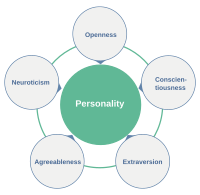
Photo from wikipedia
ABSTRACT Recent work has focused on a learning diathesis model in which specific personality factors such as behavioral inhibition (BI) may influence associative learning and in turn increase risk for… Click to show full abstract
ABSTRACT Recent work has focused on a learning diathesis model in which specific personality factors such as behavioral inhibition (BI) may influence associative learning and in turn increase risk for the development of anxiety disorders. We have found in a series of studies that individuals self‐reporting high levels of BI exhibit enhanced acquisition of conditioned eyeblinks. In the study reported here, hypotheses were extended to include distressed (Type D) personality which has been found to be related to BI. Type D personality is measured with the DS‐14 scale which includes two subscales measuring negative affectivity (NA) and social inhibition (SI). We hypothesized that SI, which is similar to BI, would result in enhanced acquisition while the effect of NA is unclear. Eighty nine participants completed personality inventories including the Adult Measure of Behavioral Inhibition (AMBI) and DS‐14. All participants received 60 acquisition trials with a 500ms, 1000Hz, tone CS and a co‐terminating 50ms, 5psi corneal airpuff US. Participants received either 100% CS‐US paired trials or a schedule of partial reinforcement where 50% US alone trials were intermixed into CS‐US training. Acquisition of CRs did not differ between the two training protocols. Whereas BI was significantly related to Type D, SI, and NA, only BI and SI individuals exhibited enhanced acquisition of conditioned eyeblinks as compared to non‐inhibited individuals. Personality factors now including social inhibition can be used to identify individuals who express enhanced associative learning which lends further support to a learning diathesis model of anxiety disorders.
Journal Title: Behavioural Brain Research
Year Published: 2018
Link to full text (if available)
Share on Social Media: Sign Up to like & get
recommendations!